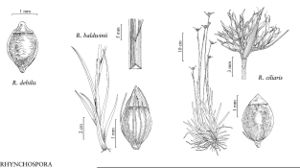Difference between revisions of "Rhynchospora baldwinii"
Ann. Lyceum Nat. Hist. New York 3: 210. 1835.
FNA>Volume Importer |
imported>Volume Importer |
||
| (One intermediate revision by the same user not shown) | |||
| Line 6: | Line 6: | ||
|place=3: 210. 1835 | |place=3: 210. 1835 | ||
|year=1835 | |year=1835 | ||
| + | }} | ||
| + | |special_status={{Treatment/ID/Special_status | ||
| + | |code=F | ||
| + | |label=Illustrated | ||
| + | }}{{Treatment/ID/Special_status | ||
| + | |code=E | ||
| + | |label=Endemic | ||
}} | }} | ||
|basionyms= | |basionyms= | ||
| Line 48: | Line 55: | ||
|publication title=Ann. Lyceum Nat. Hist. New York | |publication title=Ann. Lyceum Nat. Hist. New York | ||
|publication year=1835 | |publication year=1835 | ||
| − | |special status= | + | |special status=Illustrated;Endemic |
| − | |source xml=https:// | + | |source xml=https://bitbucket.org/aafc-mbb/fna-data-curation/src/2e0870ddd59836b60bcf96646a41e87ea5a5943a/coarse_grained_fna_xml/V23/V23_423.xml |
|genus=Rhynchospora | |genus=Rhynchospora | ||
|species=Rhynchospora baldwinii | |species=Rhynchospora baldwinii | ||
Latest revision as of 20:40, 5 November 2020
Plants perennial, cespitose, 40–100 cm; rhizomes absent. Culms stiffly erect to ascending, linear, leafy toward base, sharply trigonous, angles scabrid. Leaves shorter than culm; basal leaves forming strong rosette, shortlinear, flat, 3–5 mm wide, distal more widely spaced, narrower, apex shortacuminate, trigonous. Inflorescences: spikelet clusters 1(–2), if 2 then closely set; terminal cluster mostly dense, hemispheric; proximalmost leafy bract subulate, much exceeding clusters. Spikelets dark redbrown, ovoid, (4–)5–6 mm, apex acute; fertile scales ovate, mostly 4–4.5 mm, apex excurvedcuspidate. Flowers: bristles 12, reaching to or slightly beyond tubercle tip, antrorsely barbellate. Fruits 1–2 per spikelet, 3–3.5(–3.7) mm; body dark brown with paler center, dull, broadly ellipsoid-lenticular, 2–2.5 × 1.8–2 mm, smooth, margins flowing to tubercle; tubercle flat, concavely triangular, 0.7–1(–1.2) mm.
Phenology: Fruiting spring–fall.
Habitat: Sandy peats in low savannas, pine flatwoods, seeps, and bogs
Elevation: 0–100 m
Distribution

Ala., Fla., Ga., La., Miss., N.C., S.C.
Discussion
Selected References
None.
